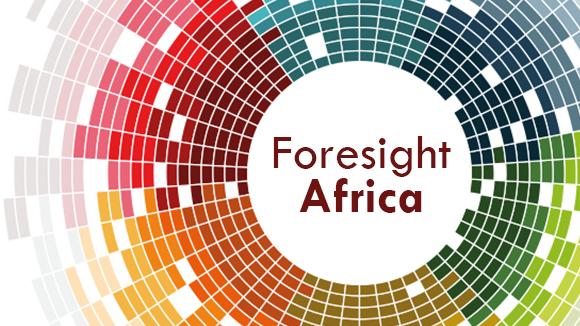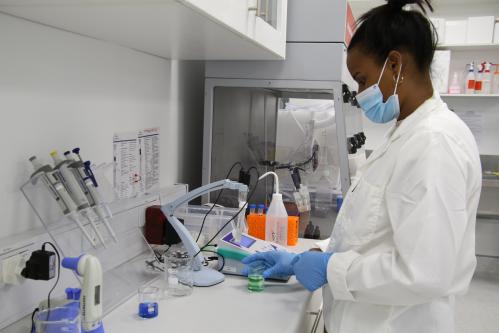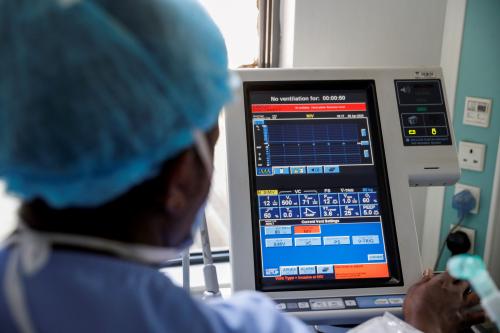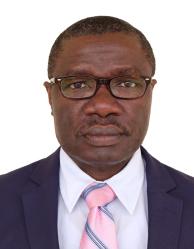Below is a viewpoint from the Foresight Africa 2022 report, which explores top priorities for the region in the coming year. Read the full chapter on public health.
 Africa is endowed with very rich biodiversity, among which include pathogens causing many of the infectious diseases afflicting the continent. Sadly, Africa has failed to use this as an opportunity to develop solutions (e.g., diagnostics, therapeutics, and vaccines) that could benefit the world. Although Africa presently produces less than 2 percent of the global research output, scientists on the continent have always demonstrated their capability to take charge when the opportunity calls and the resources abound. For instance, at the beginning of the COVID-19 pandemic, the African Center of Excellence for Genomics of Infectious Disease (ACEGID) at Redeemer’s University in Ede, Nigeria, generated the first sequence of the SARS-CoV-2 on the continent at an unprecedented speed of 72 hours from sample receipt.
Africa is endowed with very rich biodiversity, among which include pathogens causing many of the infectious diseases afflicting the continent. Sadly, Africa has failed to use this as an opportunity to develop solutions (e.g., diagnostics, therapeutics, and vaccines) that could benefit the world. Although Africa presently produces less than 2 percent of the global research output, scientists on the continent have always demonstrated their capability to take charge when the opportunity calls and the resources abound. For instance, at the beginning of the COVID-19 pandemic, the African Center of Excellence for Genomics of Infectious Disease (ACEGID) at Redeemer’s University in Ede, Nigeria, generated the first sequence of the SARS-CoV-2 on the continent at an unprecedented speed of 72 hours from sample receipt.
This success catalyzed the surge of genomic sequencing by scientists on the continent, whose data were effectively used to guide the public health response to the COVID-19 pandemic in Africa. Translational applications of these genomic sequences in Africa include the use of the gene editing technology to quickly develop a SARS-CoV-2 rapid diagnostic test (SHINE) as well as the development of COVID-19 DNA-based vaccine (DIOSYNVAX) at ACEGID in collaboration with the Broad Institute and University of Cambridge.
Africa must realize that the future of the continent’s economic growth and development is inextricably linked to R&D.
It is clear from the above examples that, in less than a decade, Africa has harnessed and localized genomic technology. However, its effective use and translational applications on the continent is limited and may not move beyond the current level of development. Many obstacles prevent the forward movement of the genomic capability demonstrated by African scientists including: 1) lack of political will; 2) lack of sustainable funding for research and development (R&D) by governments, regional funders, developmental organizations, or African private sector and philanthropists; 3) lack of local infrastructure to support R&D; 4) lack of local investment in the development and emergence of the biotechnology sector; and 5) lack of well-trained and skilled human resources. In addition, the political and academic ecosystems in Africa are not leveraging the rich and diverse resources available through its diaspora.
Africa must realize that the future of the continent’s economic growth and development is inextricably linked to R&D. The continent needs to take advantage of the weaknesses exposed by the COVID-19 pandemic to develop a well-articulated plan to accelerate translational R&D with a focus on diagnostics, therapeutics, and vaccines for infectious and noncommunicable diseases. The plan should be backed by national governments through pan-African political, health, and financial organizations with the help of the private sector. It will require leveraging the existing excellent genomic hubs in Africa, as well as the richness and the diversity of the African diaspora. More importantly, it will require long-term and sustainable investments in infrastructure development and human capacity-building.
The Brookings Institution is committed to quality, independence, and impact.
We are supported by a diverse array of funders. In line with our values and policies, each Brookings publication represents the sole views of its author(s).








Commentary
What’s next for R&D in health for Africa?
February 17, 2022